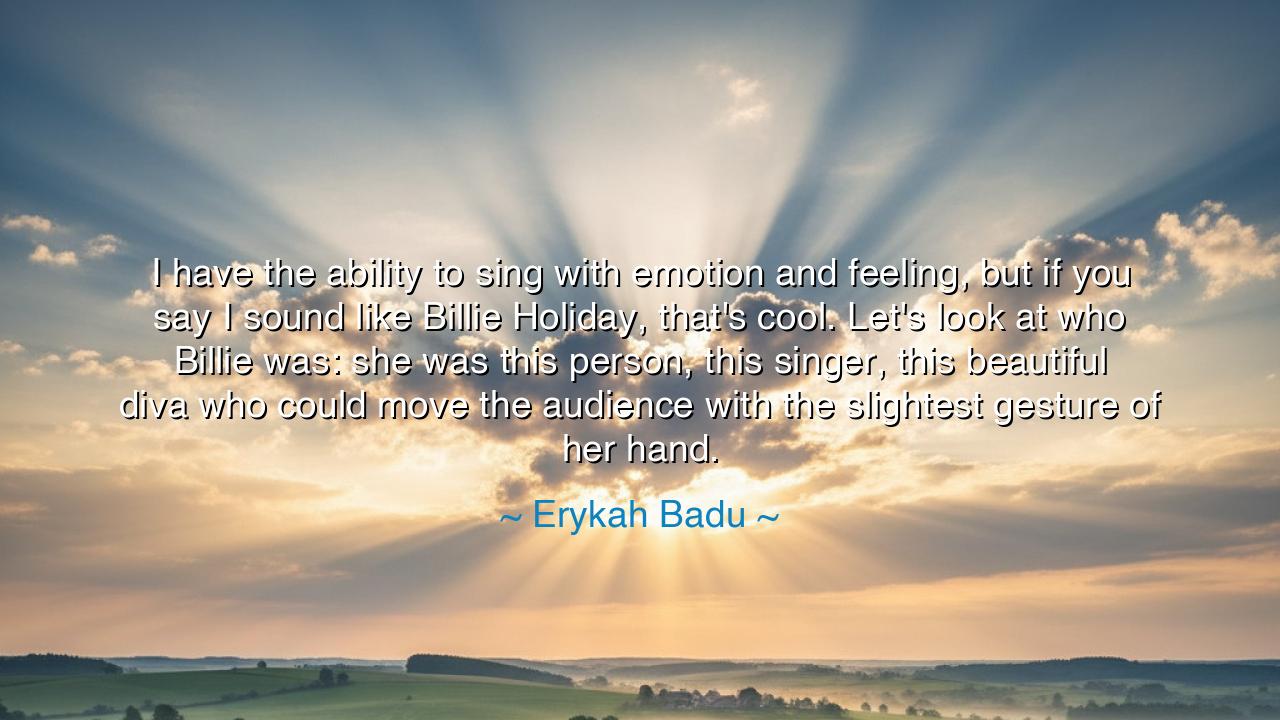
I have the ability to sing with emotion and feeling, but if you
I have the ability to sing with emotion and feeling, but if you say I sound like Billie Holiday, that's cool. Let's look at who Billie was: she was this person, this singer, this beautiful diva who could move the audience with the slightest gesture of her hand.






The artist Erykah Badu once said with grace and humility: “I have the ability to sing with emotion and feeling, but if you say I sound like Billie Holiday, that's cool. Let's look at who Billie was: she was this person, this singer, this beautiful diva who could move the audience with the slightest gesture of her hand.” In this reflection, Badu does more than speak of music — she speaks of lineage, of honor, and of the sacred chain that connects one soul of expression to another across generations. Her words remind us that art is not a competition of voices, but a communion of spirits — a shared fire passed from one heart to the next.
To understand the depth of this saying, we must look closely at what it means to be compared to Billie Holiday. Lady Day, as she was called, was not merely a singer; she was an empath of sound, a weaver of emotion who transformed sorrow into melody. Her voice carried both pain and power — the ache of oppression and the glory of resilience. When Badu says, “Let’s look at who Billie was,” she is not accepting flattery; she is invoking reverence. She recognizes that to be compared to such a woman is to be placed in the presence of the sacred, for Billie Holiday embodied truth itself — not perfection, but truth in its rawest, most human form.
In the style of the ancients, we may say that Erykah Badu speaks here of the eternal echo — the way the spirit of greatness never dies but finds new vessels in each age. Just as the philosopher Plato learned from Socrates, and Aristotle from Plato, so too do the artists of soul and song learn from those who came before. Billie’s every note was a lesson, her every silence a prayer. To hear her was to be reminded of the depth of the human heart. When Badu sings with emotion and feeling, she draws from that same well — the deep reservoir of ancestral memory that nourishes all true art.
There is also humility in her words — a humility that is itself a mark of greatness. For the wise know that authenticity does not come from rejecting influence, but from embracing it with gratitude. The proud artist says, “I am unique,” but the awakened artist says, “I am a continuation.” Badu’s acceptance of the comparison is not surrender, but wisdom. She honors Billie not as an idol to imitate, but as a mirror reflecting what is timeless in all creators: the courage to feel deeply and to let others feel through you.
Consider the story of Aretha Franklin, another daughter of this musical lineage. She grew up singing gospel in the church, where her voice, like a river of spirit, carried the prayers of her people. When she entered the realm of soul, she carried that same fire — and yet she never forgot her foremothers: Mahalia Jackson, Bessie Smith, Billie Holiday. Each of them had walked through pain and turned it into sound, teaching the world that beauty could be born even from sorrow. Badu’s quote belongs to this same tradition — a recognition that one’s art is never created in isolation, but blooms from the garden planted by those who came before.
The origin of this truth lies in the nature of creativity itself. All true art springs from the eternal dialogue between past and present. Just as a tree’s fruit is nourished by roots hidden deep in the soil, so too is the artist’s expression fed by the wisdom of their predecessors. To honor Billie Holiday is to honor the entire lineage of Black womanhood in art — women who sang not for applause, but for survival, for love, and for the right to be heard. They carried history in their throats, and through their song, they turned pain into poetry.
And so, the lesson for us is clear: honor your influences, for they are the architects of your voice. To deny them is to cut yourself from the roots that sustain you. Whether you are an artist, a thinker, or a builder, remember that greatness is not born in isolation but in continuity. Stand on the shoulders of giants, and do so with reverence. Let the fire of their example guide you, not to imitation, but to evolution. For the true way to honor those who came before is to keep their spirit alive by creating something new from it.
Therefore, let the words of Erykah Badu resound like an ancient teaching: to be compared to greatness is not a burden, but a blessing. To carry the echo of Billie Holiday is to carry the voice of history itself — a voice that reminds us of resilience, beauty, and the transcendent power of emotion. When you create, do so with the same sacred awareness: that through your work, you are not only expressing yourself — you are continuing the song of humanity. And in that song, as Badu and Billie both knew, lies the true miracle of art — that a single gesture, a single note, can move the hearts of many and ripple through time eternal.






AAdministratorAdministrator
Welcome, honored guests. Please leave a comment, we will respond soon